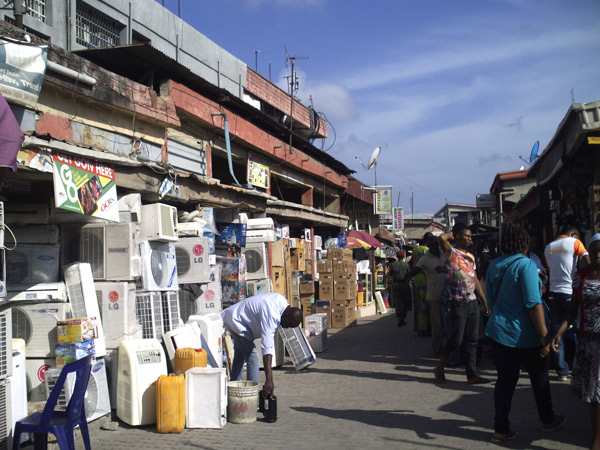
×
The mention of Alaba International Market conjures images of a hub that is bustling with business and commerce. With a reputation of being one of Nigeria’s most prominent commercial destinations, it is rated as the largest market for electronics and allied products in West Africa. The market is home to the who is who in the importation and sale of electronics, electrical and sundry household appliances and gadgets. Skilled and semi–skilled artisans, technicians and computer technologists are also found in large numbers plying their trades.
A typical day at Alaba ordinarily presents a scenario of hustle and bustle, quick sales, brisk business and other forms of merchantile activities. The myths and mystique of the market have been sustained for quite a long time. There is of course, the saying amongst traders in electronics in Nigeria that “whatever item you don’t find in Alaba International Market cannot be found elsewhere in the world.”
However, a recent survey of the market by People and Power has revealed that things have generally taken on a different shape. The situation is that of slowdown in activities and a visible decline in the buying and selling of goods and other services. It appeared obvious that Alaba traders have come under the pangs of the economic recession that has hit the nation.
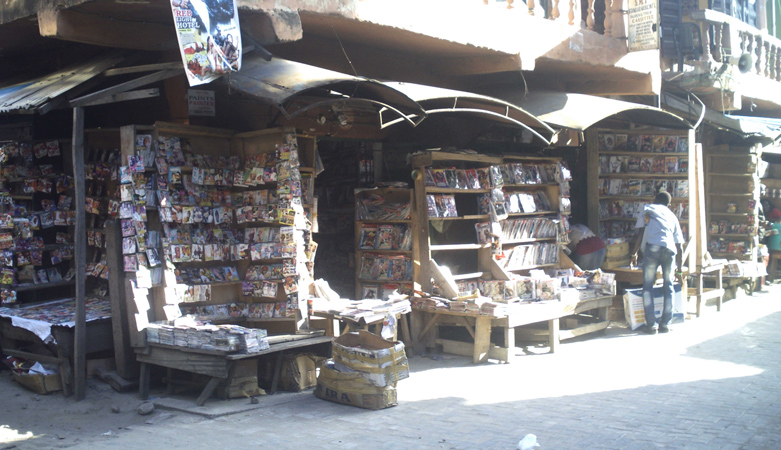
×
Most of the big time importers, manufacturers’ representatives, retailers and other service providers appear to be united in lamenting the unfortunate situation which they say is threatening their businesses to their very foundations. They are not comfortable with the Federal government’s foreign exchange policy which has cast a big wedge in the wheel of the importation business in Nigeria. To most of the traders, the root cause of the decline in their businesses is the unfortunate issue of the scarcity of foreign exchange and the sharp rise in the rate of the dollar to the naira. Others complained bitterly about prohibitive custom tariffs and other strenuous procedures now involved in the clearing of imported goods at the ports.
One major sign that showed that things were no longer the way they used to be at the market was the glaring reduction in both vehicular and human traffic along the major road that runs from the Ojo Local Government secretariat to the main entrance to the popular Electronics Line which is very close to the Nigerian Security and Civil Defence Corps post. The usual sight of assorted goods – tones of them being hauled by porters across the market – as well as buyers and sellers entering and exiting the numerous warehouses and shops across the market have reduced drastically.
Most of the popular spots around the Alaba International Market ambience also reveal the same story of low pace of activity as well as poor sales by the traders. Stories from the big time malls and plazas within the market are not different from the pervading tale of woe.
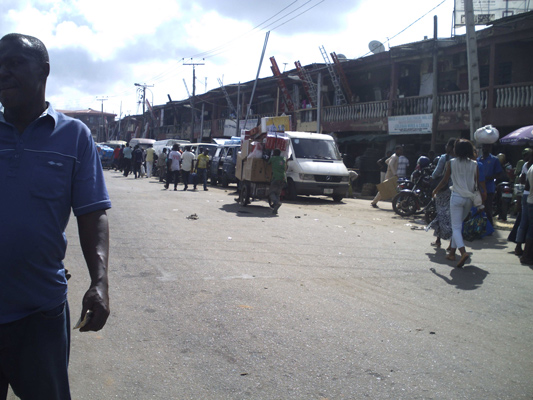
×
Traders and businessmen in the market who spoke to People and Power described the situation from several angles. Mrs. Ifeoma Uzonye of Grace and Glory Electricals Limited (dealers in high powered cables and wires) is totally pissed off by the poor state of business activities at the market which according to her, have been brought about by current government policies. She said:” The whole thing is getting worse every passing day. The prices of goods and other products are skyrocketing, and the result is that we keep losing our customers. The high exchange rate of the naira to the dollar has not helped matters also. Most of the cables for instance that sold for four thousand naira at the beginning of the year now go for six to seven thousand naira. The rate of patronage has dropped sharply and our turnover is nothing to write home about. Before now, we used to make about 15 to 20 tranches of business deals daily, now we even struggle to get up to four customers a day. I am not finding the situation funny at all. We are suffering untold hardship.”
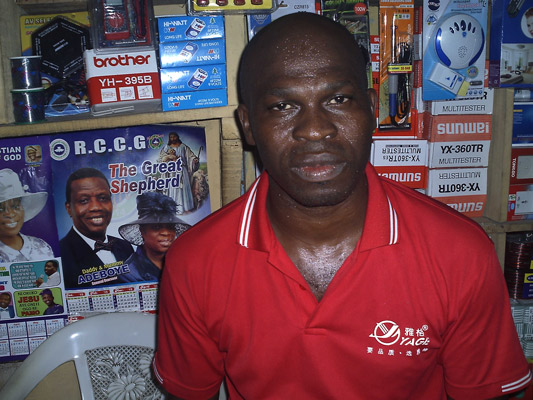
×
Mr. Chukwudi Joseph, owner of Shop B20, Electronics Line said that the prices of most electronic products have increased by 75%. “The problem is mainly with the high exchange rate of the dollar, which has forced a lot of importers to slow down on the volume of goods they bring into the country. Within the first quarter of this year, the economic meltdown dealt a severe blow on many importers in Alaba.” The popular Obosi Plaza is now a shadow of its previous bubbling and burstling form. The crowds of shoppers who usually milled around the place are now virtually non – existent. Most shop owners now sit idly.
Easily one of the busiest sections of the market after the Electronics Line, the Fashion and Fancy, (FF) Line which houses the popular Ubakason Plaza does not have a different picture. This is the heart of video C.D. business. Traders here market Nollywood movies and do a lot of video recording. Traders around this area are big time dealers in home video products and are also into the marketing of Nollywood movies and recording of musical videos. They appeared to also be caught in the same tale of poor patronage and reduction in sales.
Mr. Emeka Nwankwo, who runs one of the largest outlets at Ubakason plaza told People and Power that their businesses have gone down by over 50% percent. “It is only those who deal in fake and pirated video copies who are ready to sell at any price. You know Nigerians are easily attracted to products that sell at very low prices regardless of the quality.”
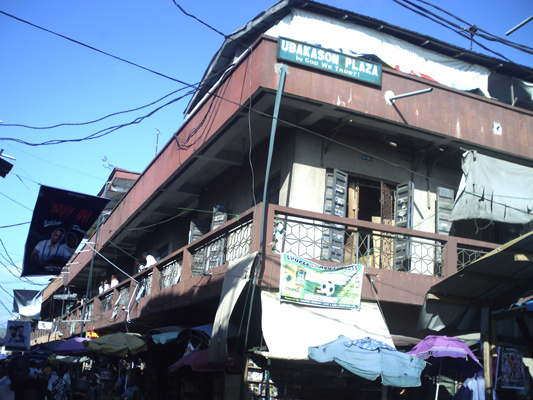
×
The meltdown currently ravaging the business of the big time importers and dealers also has a rippling effect on those involved in repairs and servicing of electronic gadgets, food vendors as well as dealers in other products aside from electronics and electrical appliances.
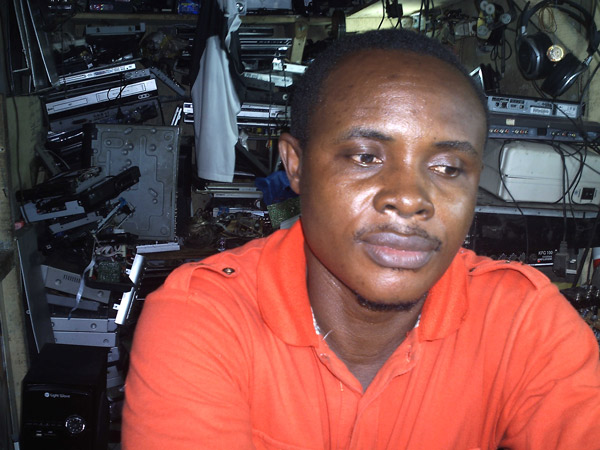
×
Mr. Chuks Ogeleka, who runs one of the most popular electronics repair shops said that “every aspect of the market is generally affected by the bad condition of the economy. If customers do not come to patronize the big time dealers, those who depend on such sales would automatically have nothing to do. The situation is biting very hard. I used to have close to 20 customers a day, but now the story is very different.”
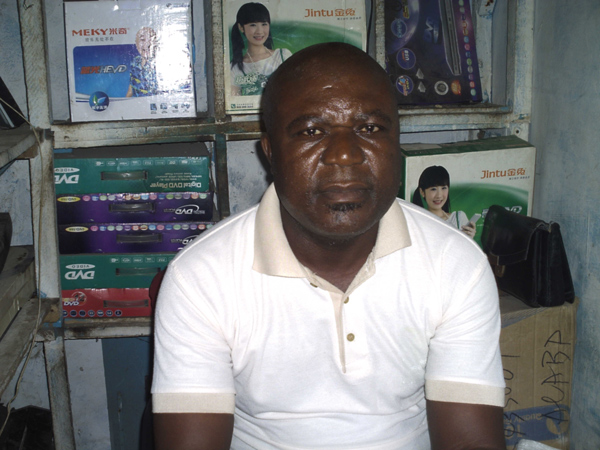
×
Chief Nicolas Nkemjika Udokwu, who is the Chairman of Shantar Group of Companies however believes that the recent economic downturn will last for only a while. Although he acknowledged the fact that with the current inflation, over sixty percent of traders in Alaba Market stand the risk of going out of business, he believes the situation will be surmounted with time. Udokwu added: “What is happening to Nigeria’s economy at the moment will be used as a testimony in future. I have hope that we shall overcome the present predicament. Buhari’s government should be given the chance to effect the change Nigerians are yearning for. The process of bringing change does not come easy. Nigerians should bear with this administration for things to get better.”

CBN Introduces New Nationwide Cash-Withdrawal Limits
Nigeria’s Foreign Reserves Hit $46bn For First Time Since 2018 — CBN
Nigeria’s Oil Output Rises Slightly to 1.4m Barrels Daily
President Tinubu Seeks Senate Nod For ₦1.15tr Domestic Loan